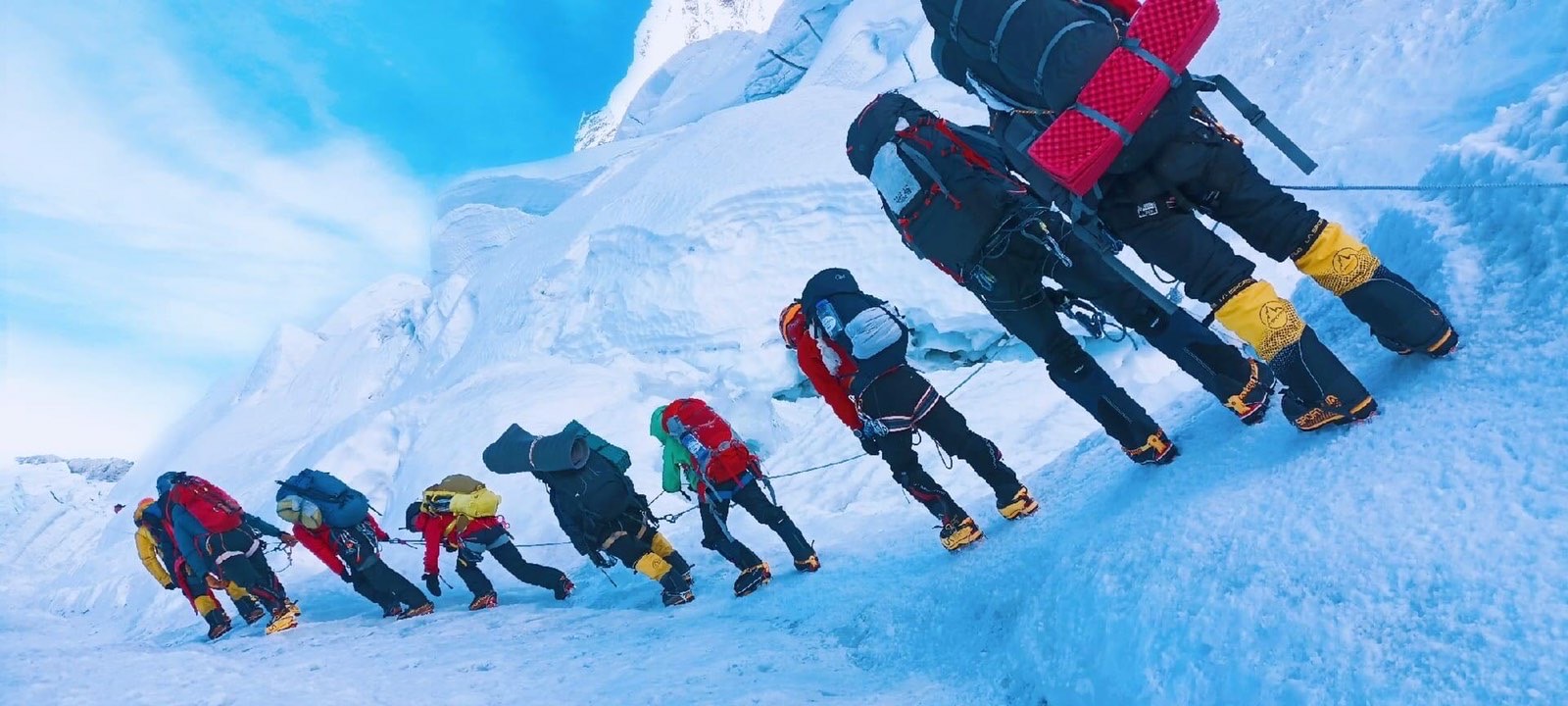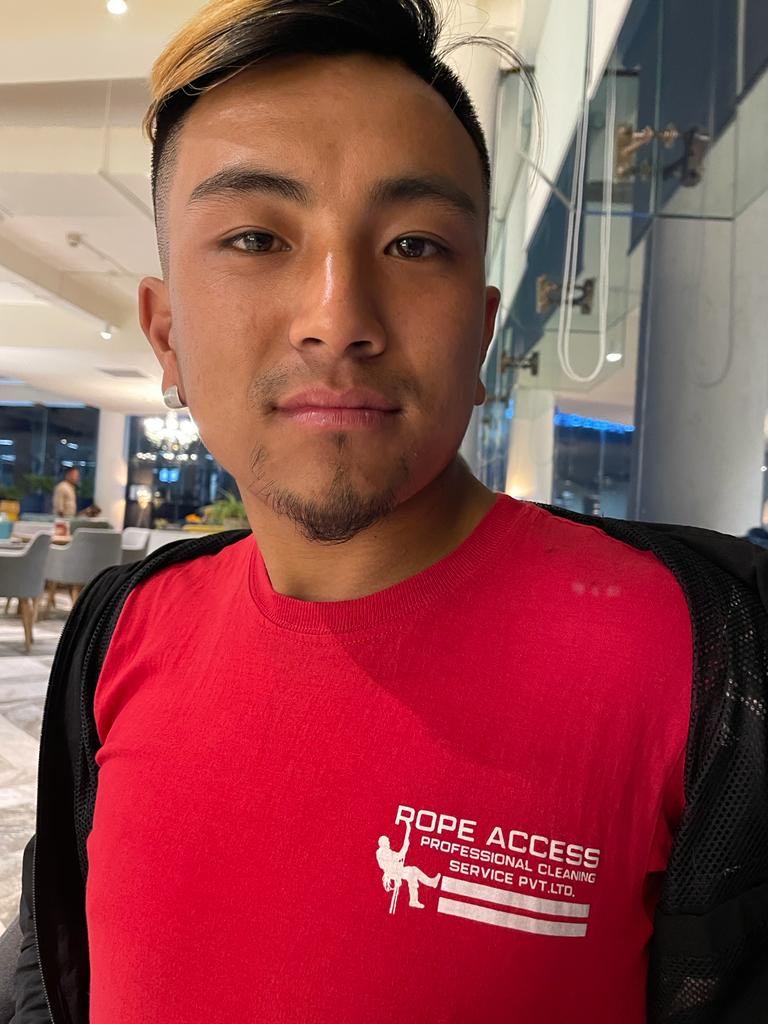The high life

This is the 11th instalment of Diaspora Diaries, a regular series in Nepali Times with the stories of Nepalis living and working abroad.
I moved from Solu Khumbu to Kathmandu when I was 10-11 years old with my brother for my education. My childhood back in my village was a combination of school and work, since I also helped my parents on the farm whenever I could.
My father is a high altitude guide who has summited Mt Everest 11 times, while my mother is mostly busy in the potato field, and also manages a trekking lodge. Our village falls in the Mera Peak trekking route, so we often had tourists staying over.
I was a shy kid, and did not interact much with them although the chocolates they handed out were always something I looked forward to.
I first joined a trek when I was 18 with my father. He was my mentor, he taught me how to fix climbing ropes and take care of our clients. It was an 18-day trek to Mera Peak, and I still remember earning Rs2,000 per day along with a $300 summit bonus.
My father would later tell me that the guests complimented my work and how despite being young and new, I had the strength of a strong climber. It is exciting on new trekking routes, but if you keep going over the same trails the up and down can start to get monotonous.
Read also: Power of workers working together, Madhusudhan Ojha

During such times, you are just left with your thoughts. It is up to you to distract yourself and find ways to stay engaged, entertained and even challenged by breaking your own previous records. My father was strict about not letting me listen to music on my earphones during treks.
Even as the son of a climbing guide with a strong reputation in the mountaineering community, I did not face a lot of pressure to get into the same profession. I did ask myself whether the risk was worth it, and felt sad whenever my father returned from the more difficult expeditions with a black weather-beaten face that took weeks to recover.
Many high altitude guides never return from expeditions, and there is always a gnawing fear before each of these difficult expeditions that something might go wrong and we may never see him again.
I remember this used to be very stressful, especially for my mother. In 2014, when we heard that there was an avalanche at Everest Base Camp, my father was out of touch for 12 hours. All we could do was pray.

The money may be good in climbing, but there are big risks. It is also more than just money, as there is so much tied to these climbs — our aspirations, a personal record we want to beat, or history we want to make. My father wants to summit Mt Everest 25 times in his lifetime.
Read Also: The Qatar job mirage, Nepali Times

I worked as a guide during trekking seasons, but decided to go to the UAE in 2019 where my brother had been working for a few years as a rope access cleaner.
It is not common for people from our village to go to countries in the Middle East or Malaysia. Only a handful have gone there for work from our village while some have emigrated to Europe, Japan or the USA for further studies.
Most continue to follow the mountaineering profession of their fathers. On my brother’s guidance, I took a one-week training in Kathmandu on rope access cleaning provided by a French trainer, received my Level A certificate and went to Dubai to work in the same company as my brother. The training cost Rs95,000, and the recruitment cost was Rs89,000.
In the UAE, I still remember how my first descent after a two-day refresher training was cleaning windows of an 89-storey skyscraper. I had never seen buildings that high in my life. Despite being used to mountains, my body was trembling as my supervisor pushed me off the ledge from the top.
Read also: Fate joins, then separates, siblings, Anil Shrestha

Nothing from my climbing experience nor the training in Nepal had adequately prepared me for this. I was disappointed about being so scared, as I descended nervously and cautiously.
The high-rises in UAE were much taller than the buildings in Kathmandu we trained in, and we had to carry two 30-litre water containers, unlike the small buckets we used in the Nepal training.
Up there 89 floors high, I felt nauseous and my feet felt weak. By the time I was finally done, my colleagues who had a similar assignment in the same building had already been resting for three hours.
But I gradually got used to the task, the height and the heat. When the temperature climbed, we used to try to find cooler parts of the buildings to clean. As we swung in the air, cars in the streets below looked like tiny toys.
The views inside through the windows were also interesting when blinds were not drawn — especially the lavish and luxurious interiors. Often, the residents would wave at us from the inside, and a few generous ones even used to tip us.
My earnings in Nepal during trekking season were quite good, but I did not really value money that much. I had a carefree खायो-घुम्यो-उडायो attitude towards the seasonal work on the mountains.
Read also: Between home and the deep blue sea, Prakash Gurung

But in the UAE, I learnt to value money perhaps because of the demanding work I did day in and day out in the heat. My pay was Rs45,000 a month, and I used to send money home, and save whatever I could.
After two years there, I decided to return to Nepal with about Rs600,000 in savings. I was not satisfied with my salary and there was no overtime work which makes a big difference for migrant workers who are just there on temporary contracts.
My brother also returned soon after I did, and we decided to use our skills and experience to start a company in Nepal, called Rope Access Professional Cleaning Service. Our business is doing quite well as we have managed to secure contracts with hotels, malls and office complexes including Marriott and Durbar Mall.
While there are challenges to running a company in Nepal, we must be doing something right as there are other players in the sector who have been around for longer. My father who initially had told me not to go abroad, now admits that this overseas experience was in fact quite beneficial for me.
I still have not left mountaineering, and want to continue guiding climbers. I had wanted to take a high altitude climbing course this year, but could not entroll in time. I am now trying to get experience in mountains higher than 7,500m, after which I have set my eyes on Mt Everest.
Read also: A father’s sacrifice for his son’s dream, Nepali Times

We climb for more than just financial reasons. I have the dream to get to the top of the world’s highest mountain at least once in my lifetime. When I do, I will unfurl my company’s banner on top.
A friend who is in the trekking business had offered to do it on my behalf during his Everest summit, but I refused the offer even though we had a banner ready. It is personal, and I dream of doing it on my own someday.
Diaspora Diaries is a regular column in Nepali Times providing a platform for Nepalis to share their experiences of living, working, studying abroad. Authentic and original entries can be sent to [email protected] with ‘Diaspora Diaries in the subject line.




